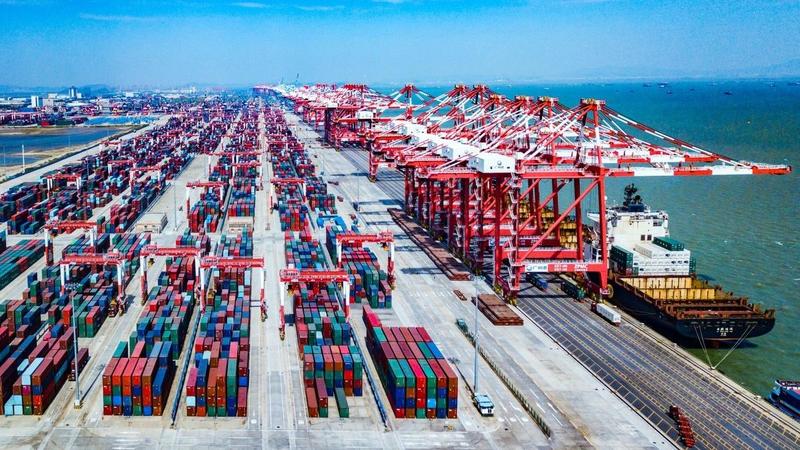 This undated photo shows a view of Nansha Port in Guangzhou, South China's Guangdong province. (PHOTO PROVIDED TO CHINA DAILY)
This undated photo shows a view of Nansha Port in Guangzhou, South China's Guangdong province. (PHOTO PROVIDED TO CHINA DAILY)
Economic momentum gained traction in China during the first two months of the year with better-than-expected performance of both supply and demand, setting a promising tone for a robust 2024.
While expressing strong confidence that the country will meet the annual growth target of around 5 percent, analysts projected a steadfast growth trajectory for the first quarter, with stimulus policies gradually taking effect.
Meanwhile, they cautioned that the outlook is still clouded by lingering challenges such as continued weakness in the property sector, structural constraints to growth and mounting uncertainties, and said that further policy easing and structural reforms to bolster confidence and reignite growth momentum are needed to achieve the annual growth target.
READ MORE: GDP growth of 5% achievable
"The January-February economic performance laid a solid foundation for the year's development," Liu Aihua, a spokeswoman for the National Bureau of Statistics, said on Monday at a news conference in Beijing.
Liu said she believes that the country has the conditions and capabilities to achieve its annual growth target this year, given its solid economic fundamentals, strengthening of factors driving recovery and effective policy measures.
Figures released by the NBS showed that China's January-February economic activity has been above expectations overall.
The country's industrial output grew 7 percent year-on-year during the period after a 6.8 percent rise in December, and fixed-asset investment increased 4.2 percent year-on-year, compared with 3 percent annual growth for 2023.
Retail sales growth slowed to 5.5 percent year-on-year during the period, compared with 7.4 percent in December, roughly in line with market expectations.
Zhou Maohua, a researcher at China Everbright Bank, said the better-than-expected figures point to the stabilization of the economy, adding that the country is expected to make a good start in the first quarter.
Looking to the full year, he said the momentum of China's economic recovery is poised to undergo further consolidation with further macroeconomic policy adjustment, improvement in domestic demand and gradual stabilization of the property sector.
NBS data showed that property investment fell 9 percent year-on-year in China in the first two months of 2024, narrowing from a 9.6 percent decline in 2023.
Louise Loo, lead economist at British think tank Oxford Economics, said the property data was broadly consistent with the credit data published earlier last week, which showed that credit demand remained worryingly sluggish at the start of the year.
"In particular, we continue to see weak bank lending to households — particularly in property-related medium- to long-term loans — amid a property sector struggling to find a floor and pent-up consumer sentiment," she said.
Loo also cautioned about the risk of good initial data prompting policy complacency, delaying decisive easing.
"After all, the year is still young, and local governments and the property sector are both poised for lengthy and bumpy credit cleanup processes," Loo added, saying that further meaningful easing will be needed to achieve the "around 5 percent" growth target.
ALSO READ: Economy set to improve in 2024: Experts
Although the broader economy is still facing downward pressures, Li Xuesong, director of the Chinese Academy of Social Sciences' Institute of Quantitative and Technological Economics, said favorable conditions outweigh unfavorable factors in China's development, and the fundamental trend of economic recovery with a long-term positive outlook has not changed.
"China has solid foundations to pursue high-quality economic development, propelled by the ongoing technological revolution, the nation's strong industrial base and the ultra-large domestic market," Li said.
Looking forward, Li said the country will likely hit a high potential growth rate of around 4.5 percent annually until 2035.
To better pursue high-quality development, Li called for further moves to deepen reforms and expand opening-up to tackle structural issues, including promoting reforms of the market-based allocation of factors and expanding opening-up in the service sector.
ouyangshijia@chinadaily.com.cn


